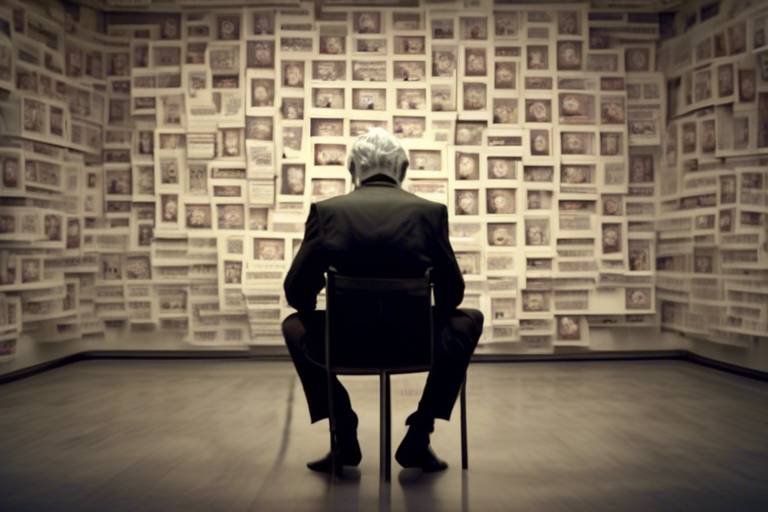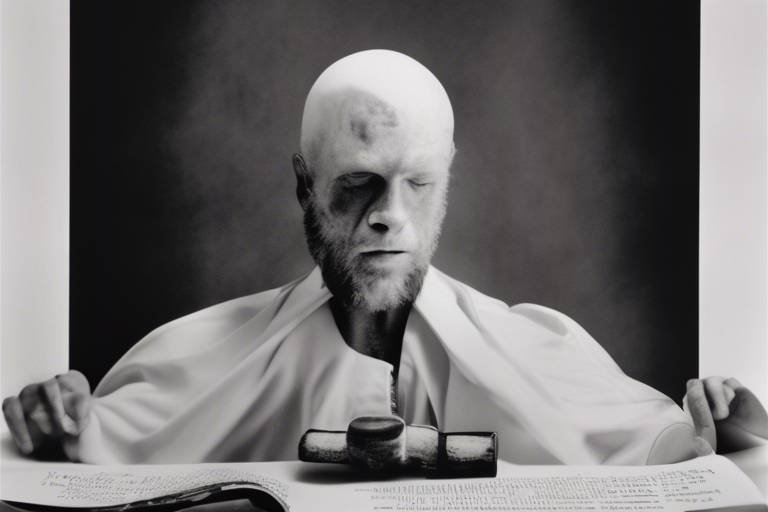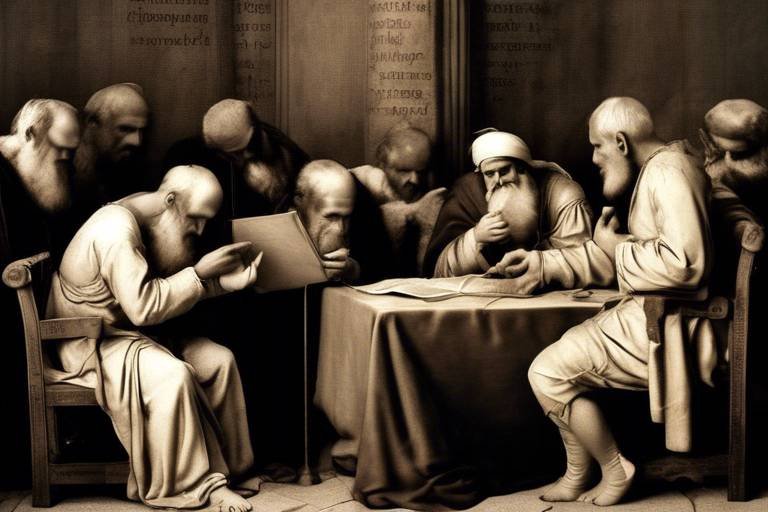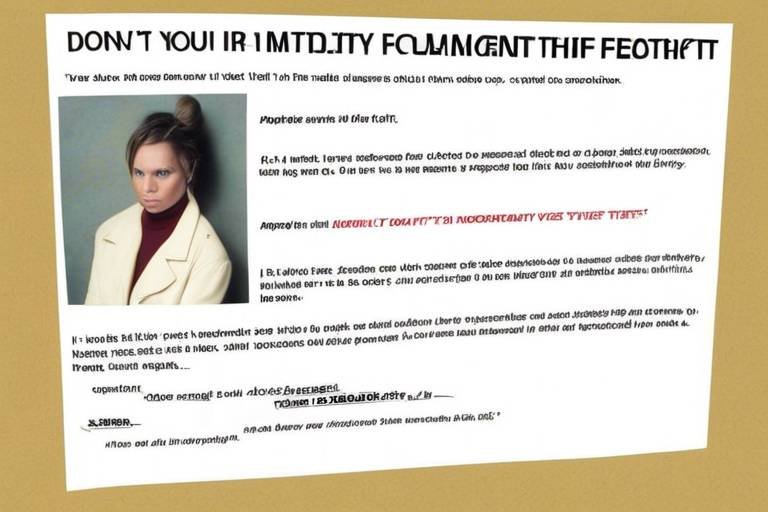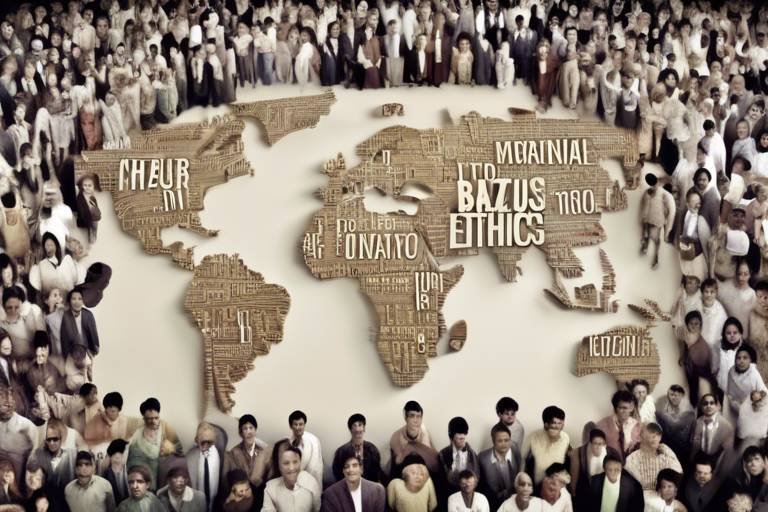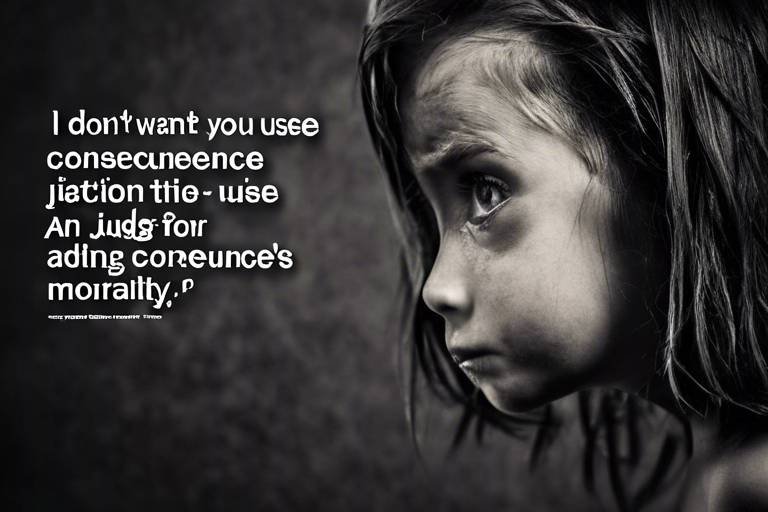The Philosophy of Civil Disobedience - An Ethical Exploration
Civil disobedience is not just a buzzword; it’s a powerful tool for social change that has echoed through the corridors of history. At its core, civil disobedience represents a moral stand against laws or policies deemed unjust. Think about it—when faced with an unjust law, what do we do? Do we comply, or do we rise up and challenge the status quo? This article dives deep into the ethical implications and philosophical foundations of civil disobedience, shedding light on its historical context, key thinkers who shaped its ideology, and the moral arguments that surround this practice of resistance.
To truly grasp the significance of civil disobedience, we must first explore its historical milestones. From the American Revolution to the Civil Rights Movement, civil disobedience has been a beacon of hope for those oppressed by unfair laws. Each era has its own unique struggles, yet the common thread remains—the courage to stand against injustice. For instance, the Boston Tea Party in 1773 was a pivotal moment where colonists protested against British taxation without representation. Fast forward to the 1960s, and we see figures like Martin Luther King Jr. leading peaceful protests against racial segregation. These events do not just represent acts of defiance; they symbolize a collective yearning for justice and equality.
Throughout history, several philosophers and thinkers have contributed to the discourse on civil disobedience, each offering unique perspectives on its moral justification. Their insights illuminate the ethical dilemmas faced by individuals who choose to resist unjust laws. Among these thinkers, three stand out: Henry David Thoreau, Mahatma Gandhi, and Martin Luther King Jr. Each of them not only challenged the norms of their time but also provided a philosophical framework that continues to inspire modern movements for change.
Henry David Thoreau’s essay, Civil Disobedience, is a cornerstone of this philosophical discourse. Thoreau argues that individuals have a duty to prioritize their conscience over government authority. In his view, true justice is rooted in individual morality, and when laws conflict with ethical beliefs, it becomes not just a right but a responsibility to resist. Thoreau famously stated, “Any man more right than his neighbors constitutes a majority of one.” This powerful assertion underscores the importance of individual moral judgment in the face of unjust governance.
Thoreau’s concept of conscience is revolutionary. He believed that each person must grapple with their ethical beliefs and act accordingly, regardless of societal pressures. This notion raises a compelling question: should we blindly follow laws, or should we evaluate their morality first? Thoreau’s advocacy for moral resistance has inspired countless movements for social change, encouraging individuals to question the legitimacy of laws that perpetuate injustice.
The ripple effect of Thoreau's ideas is evident in various civil rights movements that followed. His writings laid the groundwork for leaders like Gandhi and King, who adopted nonviolent resistance as a means to challenge systemic injustice. Thoreau’s influence reminds us that the seeds of change often sprout from the courage of individuals who dare to stand up for what is right, even in the face of adversity.
Mahatma Gandhi took Thoreau’s principles and transformed them into a powerful movement for Indian independence. His philosophy of satyagraha, or "truth force," emphasized nonviolent resistance as a means to achieve social and political change. Gandhi believed that civil disobedience was not just an act of rebellion but a profound expression of love and respect for humanity. He famously said, “You must be the change you wish to see in the world.” This mantra encapsulates the essence of civil disobedience—it’s about embodying the values we wish to promote.
As we navigate the complexities of civil disobedience, it’s crucial to examine the ethical arguments that support it. The tension between legality and morality often raises critical questions about justice, authority, and personal responsibility. Are laws inherently just, or can they perpetuate oppression? This debate is at the heart of civil disobedience, challenging individuals to consider whether they should obey laws that conflict with their moral beliefs.
The question of legal versus moral obligations is a fundamental aspect of civil disobedience. While laws are designed to maintain order, they can also be tools of oppression. When individuals encounter laws that violate their ethical principles, they face a dilemma: comply with the law or follow their conscience. This conflict is not just theoretical; it has real-world implications, as seen in various protests against unjust policies.
Engaging in civil disobedience is not without its risks. Individuals may face legal penalties, social backlash, or even imprisonment. However, the potential consequences should not deter those who feel compelled to act against injustice. The history of civil disobedience is filled with stories of individuals who faced severe repercussions yet remained steadfast in their commitment to justice. Understanding these potential repercussions is essential for anyone considering this form of protest, as it highlights the weight of their moral choice.
- What is civil disobedience? Civil disobedience is the intentional act of disobeying a law as a form of protest against policies or practices considered unjust.
- Is civil disobedience always nonviolent? While many advocates, like Gandhi and King, emphasize nonviolence, there are instances where civil disobedience has involved confrontational tactics.
- Can civil disobedience lead to social change? Yes, history shows that civil disobedience can effectively raise awareness and drive social and political change.
- What are the risks of civil disobedience? Participants may face legal consequences, social ostracism, or even physical harm, depending on the context and response from authorities.

Historical Context of Civil Disobedience
The concept of civil disobedience has deep roots in human history, evolving as a powerful tool for individuals and groups seeking to challenge oppressive systems and unjust laws. From ancient times to modern-day movements, the practice of resisting authority has taken various forms, often igniting significant social change. Think about it: when faced with laws that seem fundamentally wrong, what options do people have? Civil disobedience emerges as a response, a way to assert moral beliefs in the face of legal constraints.
One of the earliest examples of civil disobedience can be traced back to ancient Greece, where philosophers like Socrates questioned the moral foundations of laws and governance. His refusal to escape from prison after being sentenced to death for corrupting the youth of Athens is a poignant illustration of standing by one’s principles, even in the face of dire consequences. Fast forward to the 19th century, and we see the likes of Henry David Thoreau advocating for individual conscience over government mandates. His essay, "Civil Disobedience," written in 1849, articulates a philosophy that encourages citizens to act according to their moral beliefs, even if it means breaking the law.
Throughout history, civil disobedience has often coincided with significant social movements. For instance, the abolitionist movement in the United States saw individuals defying the Fugitive Slave Act, which mandated the return of escaped slaves. Activists like Frederick Douglass used civil disobedience as a means to highlight the moral bankruptcy of slavery, demonstrating that laws can be unjust and need to be challenged. Similarly, the suffragette movement in the early 20th century showcased women engaging in acts of civil disobedience to demand voting rights, often facing arrest and public scorn for their beliefs.
The 20th century brought about a wave of civil disobedience that was pivotal in shaping modern democratic societies. The Indian independence movement, led by Mahatma Gandhi, utilized nonviolent resistance as a form of civil disobedience against British colonial rule. Gandhi's philosophy of satyagraha, or truth-force, emphasized the power of peaceful protest to achieve political ends, inspiring countless movements worldwide. In the United States, the civil rights movement of the 1960s saw leaders like Martin Luther King Jr. employing civil disobedience to combat racial segregation and injustice. Their actions underscored the belief that individuals have a moral responsibility to oppose unjust laws, even at great personal risk.
In essence, the historical context of civil disobedience reveals a rich tapestry of struggles against injustice. It showcases how individuals, driven by conscience and ethical beliefs, have taken a stand against oppressive systems throughout the ages. The stories of those who dared to defy unjust laws serve as powerful reminders of the importance of standing up for what is right, even when it is difficult or dangerous. As we reflect on these historical milestones, it becomes evident that civil disobedience is not merely a tactic; it is a profound expression of humanity's quest for justice and moral integrity.

Key Philosophers and Thinkers
The discourse surrounding civil disobedience is enriched by the contributions of several key philosophers and thinkers who have shaped its ethical and moral framework. Each of these figures has offered unique perspectives that not only challenge the status quo but also inspire individuals to act against injustice. Among these influential voices, Henry David Thoreau, Mahatma Gandhi, and Martin Luther King Jr. stand out as pivotal figures whose ideas continue to resonate today.
Henry David Thoreau, an American transcendentalist, is often credited with laying the philosophical groundwork for civil disobedience. In his seminal essay, Civil Disobedience, Thoreau argues that individuals have a moral duty to resist government policies that they believe are unjust. He famously stated, "That government is best which governs least," suggesting that excessive governmental control often leads to oppression. His emphasis on individual conscience over blind obedience to the law has inspired countless movements for social change, encouraging people to prioritize their ethical beliefs when confronting unjust laws.
Thoreau's advocacy for moral resistance has had a profound impact on future civil rights movements. His ideas resonated with leaders like Gandhi and King, who adopted his principles of nonviolent resistance in their own struggles against systemic injustice. The ripple effect of Thoreau's thoughts can be seen in various social movements around the globe, where individuals have rallied against tyranny and oppression, often at great personal risk.
Moving across the ocean, we encounter Mahatma Gandhi, whose philosophy of nonviolent resistance, or satyagraha, emphasized the power of civil disobedience as a tool for achieving social and political change. Gandhi believed that true strength lies in the ability to endure suffering without retaliation. He famously led peaceful protests against British colonial rule in India, demonstrating that civil disobedience could be a powerful force for change without resorting to violence. His approach highlighted the importance of love and compassion, even towards oppressors, urging followers to challenge injustice through nonviolent means.
Another towering figure in the realm of civil disobedience is Martin Luther King Jr.. Drawing inspiration from both Thoreau and Gandhi, King articulated a vision of justice that combined moral imperatives with the necessity for social action. His leadership during the American Civil Rights Movement showcased how civil disobedience could be employed effectively to combat racial segregation and discrimination. King's famous quote, "Injustice anywhere is a threat to justice everywhere," encapsulates the interconnected nature of social justice and the moral obligation to resist injustice, regardless of its form.
In summary, the contributions of these key thinkers form a rich tapestry of ideas that inform our understanding of civil disobedience today. Each philosopher has uniquely shaped the ethical landscape, providing powerful arguments for the moral necessity of resisting unjust laws. Their legacies continue to inspire modern activists and thinkers, reminding us that civil disobedience is not merely an act of rebellion but a profound expression of our commitment to justice and equality.
- What is civil disobedience? Civil disobedience is the active, professed refusal to obey certain laws, demands, and commands of a government, typically as a nonviolent form of protest against perceived injustice.
- Who are the key figures associated with civil disobedience? Key figures include Henry David Thoreau, Mahatma Gandhi, and Martin Luther King Jr., each of whom contributed significantly to the philosophy and practice of civil disobedience.
- Is civil disobedience justified? Many argue that civil disobedience is justified when laws are unjust or violate moral principles, as it serves to highlight and challenge systemic injustices.
- What are the potential consequences of civil disobedience? Engaging in civil disobedience can lead to legal penalties, social backlash, and personal sacrifices, but it can also catalyze significant social change.

Henry David Thoreau's Influence
Henry David Thoreau, an American transcendentalist, profoundly shaped the philosophy of civil disobedience through his seminal essay, Civil Disobedience, published in 1849. In this powerful piece, Thoreau argues that individuals have a moral duty to resist unjust laws and governmental actions that conflict with their conscience. He famously states, “That government is best which governs least,” suggesting that the role of government should be minimal, allowing individuals to exercise their moral judgment. This idea resonates deeply with those who believe that ethical considerations should take precedence over blind obedience to authority.
Thoreau's emphasis on individual conscience serves as a rallying cry for countless movements advocating for social change. His belief that individuals should act according to their principles, even if it means breaking the law, has inspired activists across generations. For example, during the Civil Rights Movement, leaders like Martin Luther King Jr. drew heavily on Thoreau's ideas, emphasizing the necessity of nonviolent resistance against systemic injustice. Thoreau’s philosophy encourages a form of protest that is not only ethical but also deeply personal, urging individuals to engage in introspection about their values and the laws they choose to follow.
Moreover, Thoreau's influence extends beyond the realm of civil rights. His thoughts on civil disobedience have been pivotal in various global movements, from India's struggle for independence under Gandhi to contemporary environmental activism. In today’s society, where issues like climate change and social inequality demand urgent action, Thoreau's call for moral resistance remains relevant. His assertion that “the only obligation which I have a right to assume is to do at any time what I think right” encapsulates the essence of civil disobedience: the courage to stand up against injustice, regardless of the potential consequences.
To illustrate Thoreau's lasting impact, consider the following table that highlights key figures influenced by his philosophy:
| Influential Figure | Movement | Key Contribution |
|---|---|---|
| Mahatma Gandhi | Indian Independence Movement | Developed the concept of Satyagraha, or truth force, emphasizing nonviolent resistance. |
| Martin Luther King Jr. | Civil Rights Movement | Utilized nonviolent protest to challenge racial segregation and injustice in America. |
| Nelson Mandela | Apartheid Resistance | Advocated for civil disobedience against apartheid laws in South Africa. |
In conclusion, Thoreau's influence on civil disobedience is profound and far-reaching. His insistence on the importance of personal conscience over societal norms has empowered countless individuals to challenge injustice. As we navigate the complexities of modern governance and societal expectations, Thoreau's philosophy continues to inspire those who seek to create a more just and equitable world. His call to action is not just a historical artifact; it is a living testament to the power of individual moral conviction in the face of oppression.

Civil Disobedience
This article delves into the ethical implications and philosophical foundations of civil disobedience, exploring its historical context, key thinkers, and the moral arguments surrounding the practice of resisting unjust laws.
Understanding the historical milestones that have shaped civil disobedience provides insight into its evolution as a form of protest against injustice and oppression throughout different eras.
Exploring the contributions of influential philosophers like Thoreau, Gandhi, and Martin Luther King Jr. reveals the diverse perspectives on the moral justification of civil disobedience in various contexts.
Thoreau's essay Civil Disobedience emphasizes individual conscience over government authority, advocating for moral resistance against unjust laws, which has inspired countless movements for social change.
Thoreau argues that true justice is rooted in individual morality, urging citizens to prioritize their ethical beliefs over compliance with unjust governmental mandates.
Thoreau's ideas laid the groundwork for future civil rights movements, influencing leaders who sought to challenge systemic injustice through nonviolent resistance.
Gandhi's principles of nonviolent resistance and satyagraha demonstrate the power of civil disobedience as a means to achieve social and political change without resorting to violence.
Examining the ethical arguments for civil disobedience highlights the tension between legality and morality, emphasizing the responsibility of individuals to challenge unjust laws.
The debate over whether individuals should obey laws that conflict with their moral beliefs raises critical questions about justice, authority, and personal responsibility in society.
Understanding the potential repercussions of engaging in civil disobedience, including legal penalties and social backlash, is essential for those considering this form of protest.
is not merely a form of protest; it is a profound act of moral courage that challenges the very fabric of societal norms. This practice involves the conscious decision to disobey certain laws, regulations, or commands of a government, typically in a peaceful manner. The essence of civil disobedience lies in its ethical foundation, where individuals assert their rights and responsibilities in the face of laws they deem unjust. Imagine standing up against a tide of injustice, like a lone tree resisting a fierce storm; this is what civil disobedience embodies.
At its core, civil disobedience is a declaration that justice cannot be compromised for the sake of legality. It serves as a reminder that laws are human constructs, and when they perpetuate inequality or oppression, it is the duty of the individual to challenge them. Throughout history, civil disobedience has sparked significant social change, igniting movements that have reshaped nations. From the abolition of slavery to the civil rights movement, acts of civil disobedience have been pivotal in pushing society towards a more just and equitable future.
However, engaging in civil disobedience is not without its complexities. Those who choose this path often face severe consequences, including arrest, social ostracism, or even violence. Yet, many argue that the moral imperative to stand against injustice outweighs these risks. It raises the question: if the laws of the land are unjust, should individuals remain silent? Or should they raise their voices, even at great personal cost?
In essence, civil disobedience is a powerful tool for change, illustrating the struggle between the individual’s moral compass and the dictates of authority. It is an ethical exploration that challenges us to reflect on our values and the laws that govern us. As we navigate this complex landscape, we must ask ourselves: how far are we willing to go to uphold our beliefs? And what role does civil disobedience play in our quest for justice?
- What is civil disobedience?
Civil disobedience is the active, professed refusal to obey certain laws, demands, or commands of a government or occupying power, typically characterized by peaceful resistance. - Is civil disobedience legal?
While civil disobedience often involves breaking the law, it is usually conducted in a way that aims to highlight the injustice of those laws rather than to promote lawlessness. - What are some historical examples of civil disobedience?
Notable examples include the American civil rights movement led by Martin Luther King Jr., Gandhi's Salt March, and the protests against apartheid in South Africa. - What are the ethical implications of civil disobedience?
Civil disobedience raises questions about the moral responsibility of individuals to challenge unjust laws and the balance between legality and morality.

emphasizes individual conscience over government authority, advocating for moral resistance against unjust laws, which has inspired countless movements for social change.
This article delves into the ethical implications and philosophical foundations of civil disobedience, exploring its historical context, key thinkers, and the moral arguments surrounding the practice of resisting unjust laws.
Understanding the historical milestones that have shaped civil disobedience provides insight into its evolution as a form of protest against injustice and oppression throughout different eras.
Exploring the contributions of influential philosophers like Thoreau, Gandhi, and Martin Luther King Jr. reveals the diverse perspectives on the moral justification of civil disobedience in various contexts.
Thoreau's essay Civil Disobedience emphasizes individual conscience over government authority, advocating for moral resistance against unjust laws, which has inspired countless movements for social change. He believed that when a government is unjust, it is not only the right but also the duty of individuals to resist such authority. This notion of prioritizing personal ethics over legal obligations resonates deeply in various social movements, encouraging individuals to stand up against systemic injustice.
Thoreau argues that true justice is rooted in individual morality, urging citizens to prioritize their ethical beliefs over compliance with unjust governmental mandates. He famously stated, “That government is best which governs least,” suggesting that the more a government intervenes, the more it tends to infringe upon personal freedoms and moral judgments. This idea has become a cornerstone for those advocating for civil rights, as it empowers individuals to act according to their conscience rather than blind obedience.
Thoreau's ideas laid the groundwork for future civil rights movements, influencing leaders who sought to challenge systemic injustice through nonviolent resistance. His emphasis on moral courage has inspired activists across generations, from the suffragettes to contemporary movements advocating for racial equality and environmental justice. The essence of Thoreau's philosophy can be seen in the actions of those who refuse to accept the status quo when it contradicts their moral beliefs.
Gandhi's principles of nonviolent resistance and satyagraha demonstrate the power of civil disobedience as a means to achieve social and political change without resorting to violence.
Examining the ethical arguments for civil disobedience highlights the tension between legality and morality, emphasizing the responsibility of individuals to challenge unjust laws.
The debate over whether individuals should obey laws that conflict with their moral beliefs raises critical questions about justice, authority, and personal responsibility in society.
Understanding the potential repercussions of engaging in civil disobedience, including legal penalties and social backlash, is essential for those considering this form of protest.
- What is civil disobedience?
Civil disobedience is the active, nonviolent refusal to obey certain laws, demands, or commands of a government or occupying power, typically as a form of protest against injustice.
- Who are some key figures associated with civil disobedience?
Prominent figures include Henry David Thoreau, Mahatma Gandhi, and Martin Luther King Jr., each of whom contributed significantly to the philosophy and practice of civil disobedience.
- Is civil disobedience always justified?
The justification for civil disobedience often depends on the context and the nature of the laws being challenged. Many argue it is justified when laws are unjust and violate fundamental human rights.
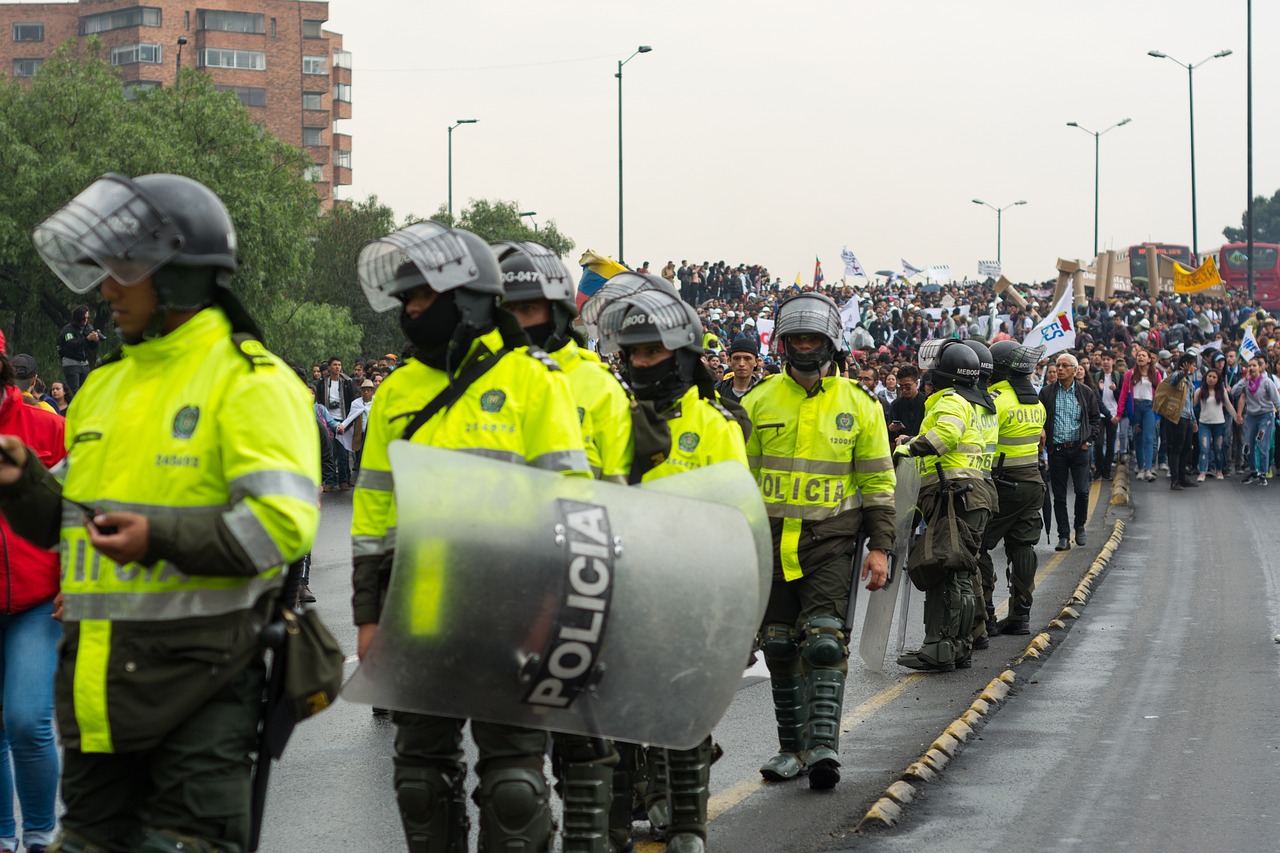
Thoreau's Concept of Conscience
Henry David Thoreau, in his seminal work "Civil Disobedience," puts forth a compelling argument that challenges the very fabric of societal norms and governmental authority. At the heart of his philosophy lies the concept of conscience, which he posits as the ultimate guide for individual behavior. Thoreau believed that each person possesses an innate moral compass that should dictate their actions, especially when faced with laws that are deemed unjust. This idea resonates deeply with the notion that true justice is not merely a reflection of legal statutes but rather a manifestation of individual morality.
Thoreau argues that when laws conflict with personal ethics, individuals have a moral obligation to resist compliance. He famously stated, "I cannot for an instant recognize that political organization as my government which is the slave's government also." This powerful assertion underscores the idea that a government that enforces unjust laws loses its legitimacy in the eyes of those who value justice. For Thoreau, the act of civil disobedience is not merely a form of protest; it is a profound expression of one’s conscience and a necessary step towards achieving a more just society.
To further illustrate Thoreau's concept of conscience, consider the following points:
- Personal Responsibility: Thoreau emphasizes that individuals must take responsibility for their actions and decisions, particularly when those actions challenge the status quo.
- Ethical Imperative: He posits that it is not only a right but an ethical duty to resist unjust laws, framing civil disobedience as a moral imperative.
- Conscience as a Guide: Thoreau suggests that one's conscience should serve as the guiding principle in determining what is just and unjust, rather than blindly following governmental dictates.
This perspective on conscience has had a lasting impact on social movements throughout history. Thoreau's insistence on prioritizing moral beliefs over legal obligations has inspired countless individuals to stand up against oppression. His ideas have been echoed in various civil rights movements, where leaders have invoked the importance of conscience in their struggles for justice. The ripple effect of Thoreau's philosophy continues to be felt today, as individuals grapple with the complexities of legality versus morality in their own lives.
In essence, Thoreau's concept of conscience serves as a powerful reminder that true justice is not a passive acceptance of laws but an active engagement with one’s ethical beliefs. It challenges us to reflect on our own values and to consider how we, too, can respond to injustice in our society. Are we willing to listen to our conscience, even when it leads us to defy authority?

Impact on Future Movements
The profound influence of Henry David Thoreau on future movements for social justice cannot be overstated. His seminal essay, Civil Disobedience, serves as a beacon for those who feel compelled to challenge the status quo. Thoreau's insistence on the primacy of individual conscience over government dictates has inspired a myriad of activists and leaders across various social movements. For instance, his ideas were pivotal in shaping the philosophies of notable figures such as Mahatma Gandhi and Martin Luther King Jr., both of whom adopted nonviolent resistance as a means to confront systemic oppression.
Thoreau’s notion that citizens have a moral duty to resist unjust laws laid a foundation for the civil rights movement in the United States. His call for individuals to act according to their moral compass resonated deeply during a time when racial segregation and discrimination were rampant. Activists drew upon Thoreau's teachings to justify their actions, believing that nonviolent civil disobedience was not just a right but a responsibility. This philosophy became a rallying cry for many, emphasizing that true justice often requires standing against the tide of popular opinion.
Moreover, the impact of Thoreau's philosophy is evident in contemporary movements as well. From the environmental activism of today to the global protests against authoritarian regimes, his ideas continue to inspire individuals to question the morality of laws and policies. The Occupy Wall Street movement, for example, echoed Thoreau's sentiments by challenging economic inequality and corporate greed, illustrating that the principles of civil disobedience are timeless and adaptable to the issues of any era.
In examining the broader implications of Thoreau's work, we can see a pattern where civil disobedience becomes a catalyst for change. The following table illustrates some key movements influenced by Thoreau's philosophy:
| Movement | Key Figure(s) | Core Issues Addressed |
|---|---|---|
| Civil Rights Movement | Martin Luther King Jr. | Racial Equality, Nonviolent Protest |
| Indian Independence Movement | Mahatma Gandhi | Colonial Oppression, Nonviolent Resistance |
| Environmental Movement | Various Activists | Climate Change, Sustainability |
| Occupy Wall Street | Various Activists | Economic Inequality, Corporate Greed |
In conclusion, Thoreau's legacy as a pioneer of civil disobedience has had a lasting impact on future movements, encouraging individuals to rise up against injustice. His philosophy serves as a reminder that the fight for justice is not only a collective endeavor but also a deeply personal one. As we navigate the complexities of modern society, the principles of civil disobedience remain a vital tool for those seeking to enact meaningful change.
- What is civil disobedience? Civil disobedience is the act of intentionally disobeying laws or regulations that are considered unjust, typically in a nonviolent manner.
- Who are some key figures associated with civil disobedience? Notable figures include Henry David Thoreau, Mahatma Gandhi, and Martin Luther King Jr., all of whom advocated for nonviolent resistance to injustice.
- How has civil disobedience influenced modern movements? Civil disobedience has inspired various contemporary movements, encouraging individuals to challenge social injustices and advocate for change.

Mahatma Gandhi's Approach
Mahatma Gandhi's approach to civil disobedience is not just a strategy; it’s a profound philosophy that intertwines ethics, spirituality, and social justice. His concept of satyagraha, or "truth force," emphasizes the power of nonviolent resistance as a means to confront and dismantle oppressive systems. Gandhi believed that true change could only be achieved through love and understanding, rather than hatred and violence. This perspective is what sets his methods apart from other forms of protest, making them not only effective but also morally uplifting.
At the heart of Gandhi's philosophy is the idea that individuals have a moral obligation to resist unjust laws. He argued that laws created by a government that violate human rights are not laws at all; they are mere commands that must be challenged. This notion resonates deeply with the ethical underpinnings of civil disobedience, as it raises the question: When is it acceptable to defy authority? For Gandhi, the answer lies in the pursuit of justice and the inherent dignity of every human being.
Gandhi's method of nonviolent resistance was not just about passive acceptance of suffering but rather an active engagement in the struggle for justice. He believed that by enduring hardship without resorting to violence, individuals could awaken the conscience of their oppressors. This transformative approach is illustrated through several key movements led by Gandhi:
| Movement | Year | Objective |
|---|---|---|
| Champaran Movement | 1917 | Address grievances of indigo farmers |
| Kheda Satyagraha | 1918 | Support farmers during famine |
| Salt March | 1930 | Protest against the salt tax |
Each of these movements exemplifies Gandhi's belief in the power of collective action grounded in moral righteousness. He understood that courage was not the absence of fear but the determination to act despite it. His approach inspired countless individuals across the globe to rise against injustice, proving that nonviolent resistance can indeed lead to profound social and political change.
Furthermore, Gandhi's teachings extend beyond the realm of politics; they touch on the very essence of human relationships. He advocated for empathy and understanding, asserting that our struggles are interconnected. This holistic view of social justice encourages individuals to see themselves as part of a larger community, fostering solidarity among those who seek change.
In essence, Gandhi's approach to civil disobedience serves as a timeless reminder that the path to justice is often fraught with challenges. Yet, through unwavering commitment to nonviolence and truth, individuals can ignite movements that resonate through history, inspiring future generations to challenge oppression with dignity and grace.
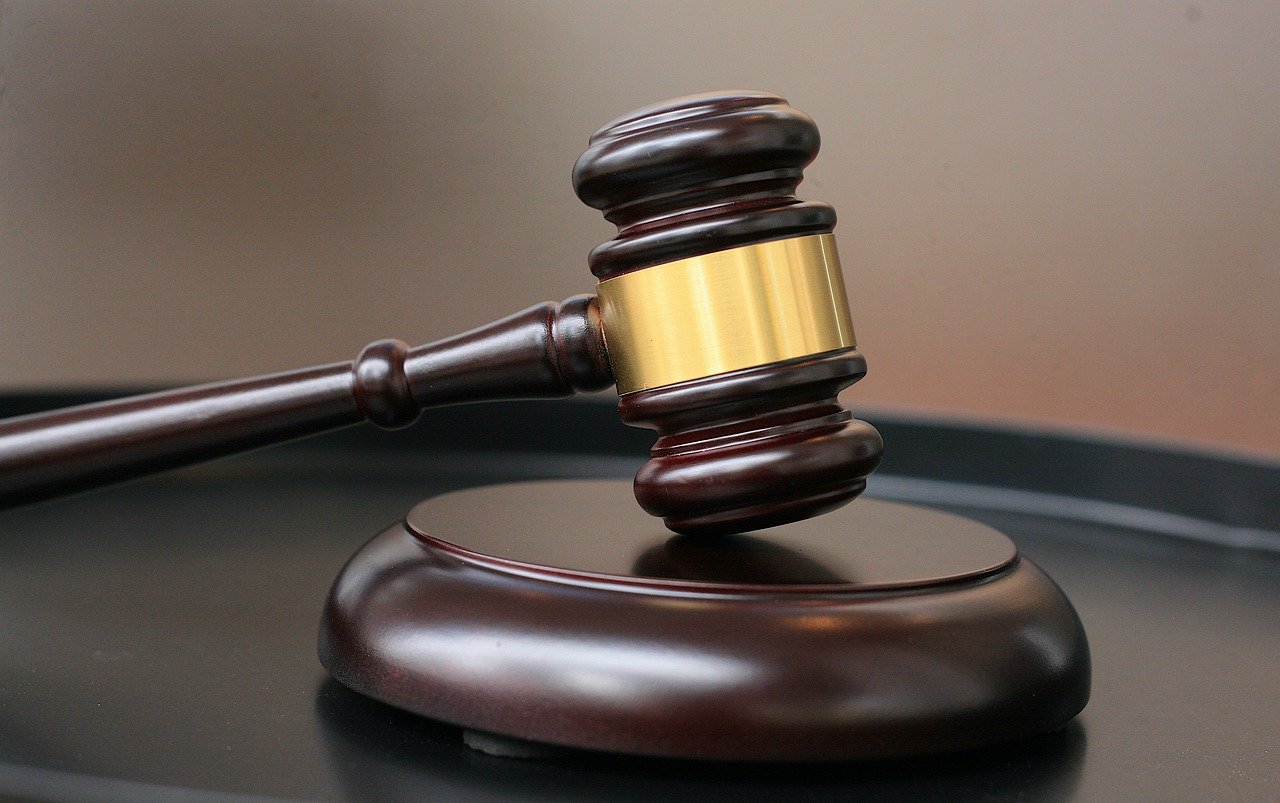
The Moral Justifications for Civil Disobedience
The practice of civil disobedience raises profound questions about the relationship between legality and morality. At its core, civil disobedience challenges the notion that laws are inherently just simply because they exist. This tension between legal obligations and moral imperatives is not just philosophical; it’s a lived reality for many individuals who find themselves at odds with the laws of their land. When laws are perceived as unjust, the moral justification for disobedience becomes a powerful tool for social change.
One of the most compelling arguments for civil disobedience is that it serves as a moral obligation to resist oppression. Consider this: when a law discriminates against a group of people or undermines fundamental human rights, is it not the duty of the citizen to stand against such injustice? This thought process leads to the understanding that individuals have a responsibility to prioritize their ethical beliefs over blind compliance with the law. As philosopher John Rawls posits, civil disobedience is a form of protest that seeks to bring about reform in a democratic society, where individuals act out of a sense of justice rather than mere legality.
Moreover, the consequences of obeying unjust laws can perpetuate systemic inequalities. For instance, laws that enforce segregation or deny equal rights can create a cycle of oppression that is difficult to break. By engaging in civil disobedience, individuals not only challenge these injustices but also inspire others to question the status quo. This ripple effect can lead to significant societal shifts, making it clear that the moral justification for disobedience often outweighs the legal repercussions.
However, the decision to engage in civil disobedience is not without its complexities. Individuals must weigh the potential consequences of their actions, which can include legal penalties, social backlash, and personal sacrifice. It’s a delicate balance between the desire for change and the acceptance of potential repercussions. Understanding this dynamic is crucial for those considering civil disobedience as a form of protest. The key question remains: Is the moral imperative to resist unjust laws strong enough to justify the risks involved?
In conclusion, the moral justifications for civil disobedience are rooted in a deep-seated belief that laws must reflect the ethical standards of society. When laws fail to do so, individuals are not only justified but perhaps even obligated to resist. This resistance is not merely an act of rebellion; it is a profound statement of one’s commitment to justice and human rights. As history has shown, civil disobedience can be a catalyst for change, igniting movements that reshape societies and redefine what is considered just.
- What is civil disobedience? Civil disobedience is the active, professed refusal to obey certain laws, demands, or commands of a government or occupying international power, usually as a peaceful form of protest.
- Is civil disobedience always justified? While many argue that civil disobedience is justified when laws are unjust, others believe that it can lead to chaos and undermine legal authority.
- What are some historical examples of civil disobedience? Notable examples include the American civil rights movement, Gandhi's Salt March, and the anti-apartheid movement in South Africa.
- What are the risks involved in civil disobedience? Engaging in civil disobedience can lead to legal penalties, social ostracism, and personal sacrifices.

Legal vs. Moral Obligations
The tension between legal and moral obligations is a central theme in the philosophy of civil disobedience. At its core, this debate raises the question: should individuals obey laws that conflict with their personal ethical beliefs? This inquiry is not merely academic; it strikes at the heart of what it means to be a conscientious citizen in a society governed by laws. For many, the law represents a set of rules designed to maintain order and protect the rights of individuals. However, what happens when these laws are deemed unjust or oppressive?
To illustrate this point, consider the following scenario: a law mandates that citizens must report undocumented immigrants to authorities. For some individuals, this law may conflict with their moral beliefs regarding compassion and humanitarian aid. In such cases, the individual faces a dilemma—should they comply with the law and potentially harm others, or should they act according to their conscience and risk legal repercussions? This conflict highlights the broader philosophical question of whether legality equates to morality.
Many philosophers argue that moral obligations should take precedence over legal ones, especially in cases where laws perpetuate injustice. This perspective is rooted in the belief that laws are human-made constructs that can be flawed or misused. Historical examples abound where individuals have chosen to disobey unjust laws, from the abolitionists who defied slavery laws to civil rights activists who broke segregation laws in pursuit of equality. These acts of civil disobedience often serve to illuminate the shortcomings of legal frameworks and advocate for change.
Moreover, the consequences of adhering strictly to legal obligations can sometimes lead to a moral compromise. Imagine a society where everyone blindly follows the law, regardless of its ethical implications. Such a scenario could foster a culture of compliance that stifles progress and perpetuates systemic injustices. On the other hand, when individuals challenge unjust laws, they often inspire collective action and societal change, demonstrating that moral courage can lead to transformative outcomes.
Ultimately, the legal versus moral obligations debate invites individuals to reflect on their values and the societal structures in which they operate. It encourages a dialogue about the role of personal ethics in shaping a just society. As we navigate this complex landscape, it is crucial to recognize that the courage to act according to one's conscience can pave the way for a more equitable future.
- What is civil disobedience? Civil disobedience is the active, public refusal to obey laws or government demands that are considered unjust, often characterized by nonviolent resistance.
- Is civil disobedience ever justified? Many argue that civil disobedience is justified when laws are unjust, as it serves to challenge and change those laws through moral persuasion.
- What are the risks associated with civil disobedience? Engaging in civil disobedience can lead to legal penalties, social backlash, and personal sacrifice, but it can also inspire change and bring attention to important issues.

Consequences of Civil Disobedience
The act of civil disobedience, while often noble and rooted in a desire for justice, does not come without its consequences. When individuals choose to stand against unjust laws, they must be prepared to face a myriad of outcomes, both personal and societal. The repercussions can range from legal penalties to social ostracism, and understanding these potential consequences is crucial for anyone considering this form of protest.
First and foremost, engaging in civil disobedience often leads to legal ramifications. Protesters may find themselves arrested, fined, or otherwise penalized for their actions. For example, during the Civil Rights Movement, many activists were jailed for their participation in sit-ins and marches. These legal consequences serve as a reminder that while the moral high ground may be clear, the law can be a formidable opponent. The table below illustrates some notable examples of civil disobedience and the resulting legal consequences faced by the activists:
| Activist | Action | Consequence |
|---|---|---|
| Henry David Thoreau | Refusal to pay taxes | Arrested and jailed |
| Mahatma Gandhi | Salt March | Imprisonment |
| Martin Luther King Jr. | Nonviolent protests | Arrested multiple times |
Beyond legal issues, there are also social consequences to consider. Individuals who engage in civil disobedience may face backlash from their communities, including criticism, isolation, or even violence. In some cases, those who resist unjust laws are labeled as criminals or troublemakers, which can tarnish their reputations and alienate them from friends and family. This social stigma can be particularly difficult to navigate, as the very act of standing up for one’s beliefs may lead to a sense of loneliness and despair.
Additionally, the impact of civil disobedience can extend to the broader societal context. While some protests may spark significant change, others may lead to increased tension or conflict. For instance, the violent reactions to peaceful protests can sometimes result in a crackdown by authorities, leading to a cycle of repression and resistance. This dynamic raises critical questions about the effectiveness of civil disobedience as a strategy for social change. Are the potential consequences worth the risks? How can activists prepare for the fallout of their actions?
Ultimately, the consequences of civil disobedience are complex and multi-faceted. While the pursuit of justice is a noble cause, it is essential for activists to weigh the potential repercussions carefully. Understanding that civil disobedience can lead to both personal sacrifice and societal upheaval is vital for anyone who chooses to stand against injustice.
- What is civil disobedience? Civil disobedience is the active, professed refusal to obey certain laws or demands of a government, often in a peaceful manner.
- Is civil disobedience always nonviolent? While civil disobedience is typically characterized by nonviolent resistance, some movements have experienced violence as a response to their actions.
- What are some historical examples of civil disobedience? Notable examples include the Boston Tea Party, Gandhi's Salt March, and the Civil Rights Movement led by Martin Luther King Jr.
- What should individuals consider before participating in civil disobedience? Individuals should consider the potential legal, social, and personal consequences of their actions, as well as the overall goals of their protest.
Frequently Asked Questions
- What is civil disobedience?
Civil disobedience is the active, nonviolent refusal to obey certain laws, demands, or commands of a government or occupying power, based on moral or ethical grounds. It’s a way for individuals to express their dissent and challenge unjust laws while remaining committed to nonviolence.
- Who are the key philosophers associated with civil disobedience?
Some of the most influential thinkers include Henry David Thoreau, who emphasized individual conscience; Mahatma Gandhi, known for his principles of nonviolent resistance; and Martin Luther King Jr., who applied these concepts in the American civil rights movement. Each contributed unique perspectives on the moral justification for resisting unjust laws.
- What are the ethical implications of civil disobedience?
The ethical implications revolve around the conflict between legality and morality. While laws are meant to maintain order, they can sometimes be unjust. Civil disobedience challenges individuals to weigh their moral beliefs against societal laws, raising questions about personal responsibility and justice.
- What are the potential consequences of engaging in civil disobedience?
Engaging in civil disobedience can lead to various consequences, including legal penalties, arrest, and social backlash. However, many practitioners view these risks as necessary sacrifices for the greater good and a means to draw attention to injustice.
- How can civil disobedience be effective?
Civil disobedience can be effective by raising public awareness and sparking dialogue about injustices. When individuals peacefully resist unjust laws, they can mobilize communities, influence public opinion, and ultimately lead to societal change.
- Is civil disobedience always nonviolent?
Yes, civil disobedience is fundamentally rooted in nonviolence. The philosophy behind it is to resist unjust laws without resorting to physical harm or violence, thereby maintaining moral high ground and garnering sympathy for the cause.
- Can civil disobedience be justified in a democratic society?
Yes, many argue that civil disobedience is not only justified but necessary in a democratic society when laws are unjust. It serves as a form of checks and balances, allowing citizens to hold their government accountable and advocate for change.
- What role does individual conscience play in civil disobedience?
Individual conscience is central to civil disobedience. It compels individuals to act against laws that they perceive as immoral or unjust, emphasizing the importance of personal ethics over blind obedience to authority.


